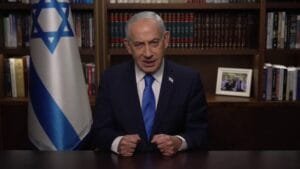Vietnam courts European leaders as US tariff threat looms
Vietnam is shifting its focus toward Europe, hosting key European leaders in a series of high-level meetings over the next two months.

File Source: Google
In response to growing concerns over potential retaliatory U.S. tariffs, Vietnam is shifting its focus toward Europe, hosting key European leaders in a series of high-level meetings over the next two months.

On Tuesday, President Luong Cuong met with King Philippe of Belgium and a business delegation, urging them to invest in crucial sectors like high-tech manufacturing, renewable energy, and infrastructure. During the meeting, King Philippe expressed interest in having Belgian businesses specializing in wastewater treatment, energy, and rare minerals establish operations in Vietnam.
Cuong also pushed for Belgium to ratify the EU-Vietnam Investment Protection Agreement, a deal signed six years ago that has yet to come into force due to the lack of ratification by a third of the EU member states.
In the coming weeks, two more European delegations are expected to visit Vietnam. EU trade commissioner Maros Sefcovic is scheduled to be in Hanoi on April 11, followed by European Commission President Ursula von der Leyen’s visit in May. Spanish Prime Minister Pedro Sanchez will also visit from April 8-12, following Spain’s pioneering move in 2009 to elevate its relationship with Vietnam to a strategic partnership.
Carl Thayer, emeritus professor at the University of New South Wales, explained that Sanchez’s visit will focus on exploring new trade and investment opportunities in renewable energy and infrastructure. Spain, as a founding member of Airbus, is also expected to play a role in encouraging the aircraft manufacturer to increase its investments in Vietnam’s aerospace sector, particularly in component production, maintenance facilities, and supply chain development.
Vietnam’s growing interest in expanding its European ties comes amid fears of higher U.S. tariffs in retaliation for its substantial trade surplus with the United States. In an effort to avert these potential tariffs, known as the “Liberation Day” tariffs, Vietnam took proactive steps on Tuesday by reducing import duties on a range of American goods. U.S. President Donald Trump has indicated plans to announce new tariffs on an unspecified number of countries as early as Wednesday.
Despite these concerns, Vietnam is already preparing for the possibility of increased export costs to the U.S. by strengthening its relationship with Europe, where it benefits from a free trade agreement. Since the EU-Vietnam free trade agreement went into effect in 2020, bilateral trade has surged by nearly 48%, reaching US$68.4 billion last year.
As Vietnam looks to deepen its ties with Europe, there is speculation that relations could be elevated to a Comprehensive Strategic Partnership when von der Leyen meets Prime Minister Pham Minh Chinh next month. Carl Thayer predicts that this upgraded partnership could place Vietnam’s relationship with the EU on par with its ties to major global powers like the U.S. and China.
Increased trade between the EU and Vietnam may also include the resumption of Vietnamese seafood exports, provided Vietnam demonstrates progress in addressing illegal, unreported, and unregulated fishing. On the EU’s side, Vietnam could offer access to valuable rare earth minerals, essential for manufacturing products like electric vehicles.
If President Trump follows through on imposing higher tariffs, Thayer sees potential benefits for both Vietnam and the EU. “If Trump’s tariffs force U.S. manufacturers in Vietnam to cut jobs due to reduced exports, this will create opportunities for stronger trade ties and EU investment in Vietnam, where labor costs remain comparatively low,” he said.














